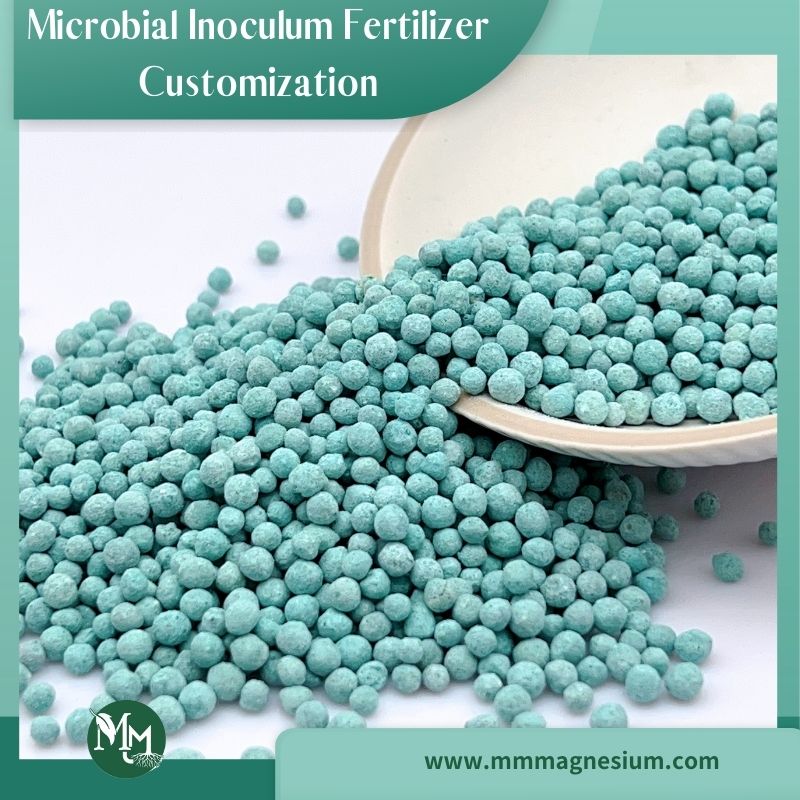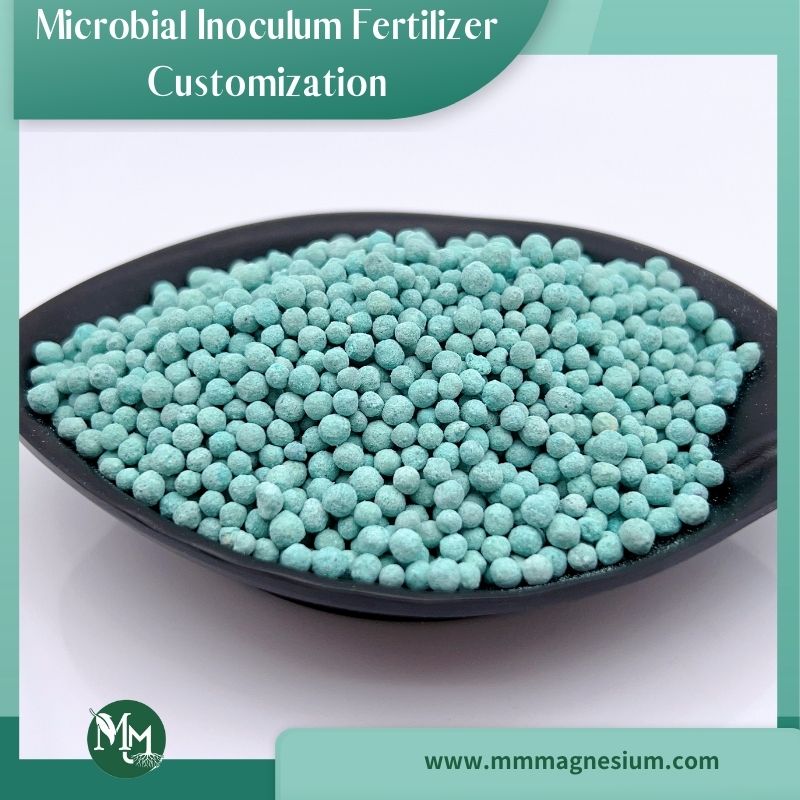

Effective live bacteria count ≥ 500 million/g
Effective live bacteria name: Bacillus subtilis, Bacillus licheniformis, Bacillus amyloliquefaciens, Rhizobium, etc.
Si+Ca+Mg ≥ 25%
Trace elements ≥ 2%
Granular size: 2-4mm
Applicable crops: This product is suitable for field crops such as rice, corn, and wheat; fruit and vegetable crops such as apples, peaches, and tomatoes; and economic crops such as onions, garlic, peanuts, and potatoes.




Yingkou Maomei Agricultural Technology Co., Ltd., relying on high-quality mineral resources, produces microbial inoculum fertilizer products with advanced technology and the following characteristics:
Products are exported to the United States, Russia, Indonesia, Canada, Spain, Malaysia, Bangladesh, and other countries, and also cover all provinces, cities, and regions across the country.
For more service advantages of Yingkou Maomei Agricultural Technology, please see Why choose us? and Factory Photos.
Advantages of Microbial Fertilizer, Customization
1. Provide comprehensive nutrition: This fertilizer contains silicon, calcium, magnesium, sulfur, boron, zinc, iron and other necessary medium and trace elements. It can meet the various nutrients required for crop growth and prevent and correct the lack of certain nutrients. Growth disorders caused by certain elements.
2. Enhance crop stress resistance: Microbial inoculants can improve crops’ ability to adapt to adverse environmental conditions. For example, under adverse conditions such as drought and saline-alkali, the growth of crops is significantly improved after the application of this fertilizer. According to experimental data, the survival rate of crops treated with this fertilizer increased by 20% under drought conditions.
3. Improve soil structure: Elements such as silicon and calcium in fertilizers help improve the physical structure of the soil and enhance soil aeration and water retention. Microbial inoculants promote the formation of soil aggregate structure and improve soil fertility by decomposing organic matter.
4. Improve nutrient utilization: Microbial inoculants can improve the effectiveness of nutrients in the soil and the absorption efficiency of plants by fixing nitrogen, decomposing phosphorus, and decomposing potassium, reducing the use of chemical fertilizers and improving fertilizer utilization.
5. Promote root growth: The microbial inoculants in fertilizers can secrete plant growth hormones, promote the development and growth of root systems, enhance the water and fertilizer absorption capabilities of crops, and improve the stress resistance of crops.
6. Improve crop yield and quality: Under the combined effect, this fertilizer can significantly improve crop yield and quality. The reasonable supply of medium and trace elements and the multiple effects of microbial inoculants make crops grow stronger, fruits fuller and of higher quality. For example, the sugar content of apples treated with this fertilizer increased by 8%, the hardness increased by 10%, and the fruits were sweeter and crisper.
7. Increase ground temperature and promote seed germination: Microbial inoculants can generate heat in the soil and moderately increase ground temperature, especially in early spring and late autumn, to promote seed germination and seedling growth.
8. Increase soil organic matter content: Microbial inoculants increase soil organic matter content and improve soil fertility by decomposing organic matter.

Fertilization Recommendations
The following dosage recommendations can be adjusted according to soil fertility, crop needs and fertilization schemes.

1. Protect from rain and sunlight, store in a ventilated and dry place, and do not transport or store together with toxic and hazardous substances.
2. Each bag is 25 kg, and we can also provide packaging as small as 1 kg or as large as ton bags according to customer requirements.
3. Plastic woven bags, lined with plastic inner bags. We provide all available packaging such as paper plastic bags/kraft paper bags/PE bags.
4. We provide a variety of transportation methods: road transportation, railway transportation, air transportation, container transportation, and ocean transportation.
5. Our company's marks can provide OEM or neutral marks.

FAQ
1.Can you provide detailed parameter descriptions of fertilizers?
Yes, we can provide detailed parameter descriptions of fertilizers. These parameters include information such as product composition, nutrient content, pH value, solubility, recommended dosage, etc. You can ask our sales team for product instructions to learn more about our product characteristics and usage methods.
2.How fast is the fertilizer absorbed?
Our fertilizer has a fast absorption rate. After scientific proportioning and fine processing, our products can release nutrients in a short time and provide plants with immediate nutrient replenishment. This helps promote plant growth and development, and improve yield and quality.

Product Knowledge:Effect of Bacillus subtilis on the prevention and treatment of root rot

Root rot is a plant disease caused by a variety of soil-borne pathogens, which seriously affects crop growth and is one of the main diseases affecting crop health and yield. Bacillus subtilis has shown significant effects in controlling crop root rot. A study on the use of Bacillus subtilis in the prevention and treatment of cucumber root rot showed that the incidence of cucumber root rot in the treatment group was reduced by 45% and the yield increased by 15%. Another study showed that in a test to control tomato root rot, the disease incidence in the Bacillus subtilis treatment group was reduced by 50%, and the growth status and yield of the plants were significantly improved.
Control mechanism of Bacillus subtilis
1. Produce antibacterial substances
Bacillus subtilis can produce a variety of antibacterial substances, including antibiotics, bacteriocins, volatile organic compounds (VOCs) and lipopeptides. These substances can effectively inhibit the growth of pathogenic bacteria. For example, lipopeptides such as surfactin, iturin and fengycin produced by Bacillus subtilis can damage the cell membrane of pathogenic bacteria and inhibit their growth and spread.
2. Competitive exclusion
Bacillus subtilis can quickly colonize the plant rhizosphere and reduce the survival chances of pathogenic bacteria by competing with pathogenic bacteria for nutrients and space resources. This competitive exclusion mechanism plays an important role in controlling root rot.
3. Induction of plant systemic resistance (ISR)
Bacillus subtilis can induce systemic resistance (ISR) in plants and enhance the plant's own defense capabilities. The ISR mechanism mainly relies on the jasmonic acid (JA) and ethylene (ET) signaling pathways, allowing plants to respond quickly and resist disease when infected by pathogenic bacteria.
In order to get the most out of Bacillus subtilis, you need to pay attention to the following points:
1. Strain selection: Different strains of Bacillus subtilis have different effects in promoting plant growth and enhancing immunity. Appropriate strains should be selected based on crop type and disease characteristics.
2. Application method: Reasonable application method and application amount are the key to ensuring that Bacillus subtilis can exert its maximum effect. It can be applied through seed soaking, seed dressing, rhizosphere irrigation, etc.
3. Environmental factors: Environmental factors such as soil pH, temperature, and humidity have an important impact on the colonization and activity of Bacillus subtilis and should be adjusted according to specific conditions.
Yingkou Maomei Agricultural Technology Co., Ltd
Name: Brenda
Mobile:86-188-7490-2028
Tel:86-400-699-8826
Whatsapp:86-18874902028
Email:info@maomeimg.com
Add:Qianjia Village, Nanlou Economic Development Zone, Yingkou City, Liaoning Province, China